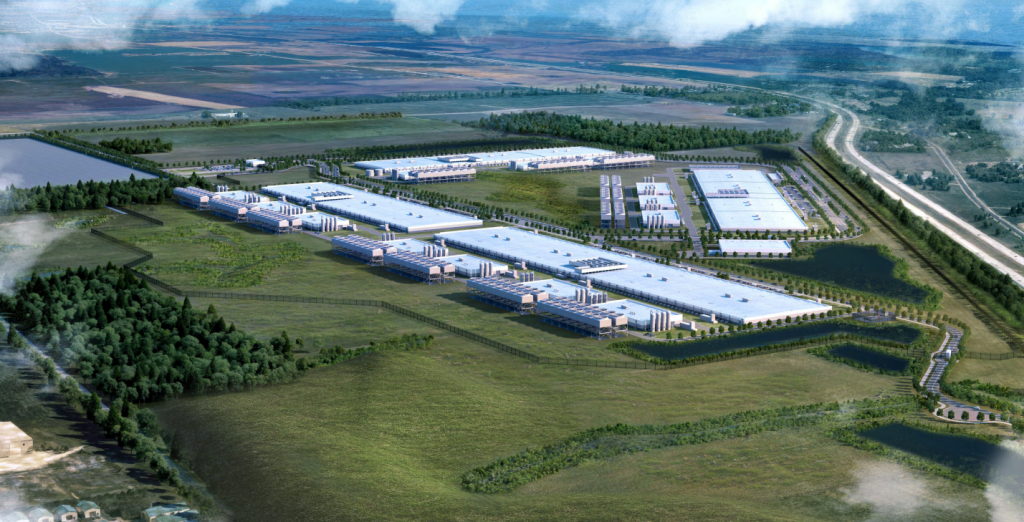The Debate Over Data Centers
Controversial for local communities. Candidates for state office may have to pick sides.

Rendering of proposed Port Washington data center complex. Rendering courtesy of the city of Port Washington
In western Wisconsin, elected officials in Menomonie put a proposed $1.6 billion data center on hold after residents raised environmental concerns and an opposition group launched a “save our city” campaign.
In southeast Wisconsin, Port Washington officials may approve a controversial $458 million TIF district for an $8 billion AI data center next month. The Milwaukee Journal Sentinel reported that the plan would reimburse “Vantage, a Denver-based data center operations and development company, for fronting $175 million in infrastructure improvements” for the center.
In Dane County, QTS Data Centers is considering a project on a 600-acre site in the town of Vienna. If it is built and operates cloud computer systems 24/7, county official Kathy Kuntz estimated that it “would use about two-and-a-half times the electricity that all of Dane County uses currently,”
And in Mount Pleasant, Microsoft says the “world’s most powerful data center” will open next year and a second one will soon follow, bringing the company’s investment in Wisconsin to $7 billion.
These and other proposed data centers are on a collision course with Wisconsin’s next election cycle: In April, local voters will determine who runs their towns, villages, cities and counties and, in November, who will be elected governor, attorney general and which party will control the Legislature.
For the first time, candidates for all those elected positions are likely to be asked their positions on data centers. Do they offer economic growth opportunities, or threaten the environment and quality of life for neighboring communities?
Candidates for governor, attorney general and the Legislature may field these additional questions: Should the 2023 sales tax exemption for property used to construct and operate data centers, including the massive amounts of electricity each center uses, be repealed? Is that sales tax exemption fair, since data centers are often built by some of the most profitable companies in the world?
But local elected officials, who have lived with state-imposed limits that link what they can levy in property taxes to growth in property values, see data centers as a long-term way to raise their community’s tax base. That could ease the squeeze on paying for local services.
For example, an $8 billion Port Washington data center in Port Washington would be about 20 times the state Department of Revenue’s $408 million estimate of all property in the city and town of Port Washington.
Although local officials make the final decisions on data centers, state agencies play critical roles in their operations.
The state Department of Natural Resources monitors the water that data centers rely on to operate.
The state Public Service Commission is charged with making sure electricity demands, which increase exponentially when data centers open, can be met. Data centers proposed across the state are “game changers” in the amounts of electricity they demand, warns Tom Content, executive director of the Citizens Utility Board.
And the Wisconsin Economic Development Corporation (WEDC) notifies the Department of Revenue when a business qualifies for the data center sales tax exemption.
The Revenue Department says the Microsoft sales tax exemption for the Mount Pleasant centers was approved in October of 2023; the exemption for Epic Hosting LLC, of Verona, in September of 2024, and the exemption for Degas LLC in February of this year for a Beaver Dam site.
Microsoft executive Brad Smith, who posted on the company’s website that he “spent almost five years as a kid going to school and delivering morning newspapers in Mount Pleasant,” said Wisconsin is lucky to be the site of the company’s data centers.
“It’s not just about running AI — it’s about creating it,” Smith insisted. “This is where the next generation of AI will be trained… New discoveries in medicine, science, and other critical fields will start right here, with the models we train in Wisconsin.
“What does that mean for the average Wisconsinite? It means new jobs, new skills, and new opportunities — right here at home. From union construction roles to long-term careers in operations and IT, this facility is creating pathways for Wisconsinites to be part of the future of technology,” Smith adds.
“It means students at Gateway Technical College can train for high-demand roles through Wisconsin’s first Datacenter Academy. It means local companies — from manufacturers to startups — can partner with Microsoft engineers to turn AI ideas into real solutions.”
But one candidate for governor, Democratic Rep. Francesca Hong, of Madison, is not convinced.
“Data centers aren’t just ugly,” Hong said in a Facebook post. “They also guzzle water, hike power bills, and put profits over people. Proud to see our communities fighting back. I’ll always stand with the people against Big Tech greed.”
Steven Walters started covering the Capitol in 1988. Contact him at stevenscotwalters@gmail.com
If you think stories like this are important, become a member of Urban Milwaukee and help support real, independent journalism. Plus you get some cool added benefits.
The State of Politics
-
A Wisconsin Political Trivia Quiz
 Dec 15th, 2025 by Steven Walters
Dec 15th, 2025 by Steven Walters
-
The Fight Over Wisconsin’s House Districts
 Dec 8th, 2025 by Steven Walters
Dec 8th, 2025 by Steven Walters
-
The Battle Over On-Line Betting
 Nov 24th, 2025 by Steven Walters
Nov 24th, 2025 by Steven Walters




















